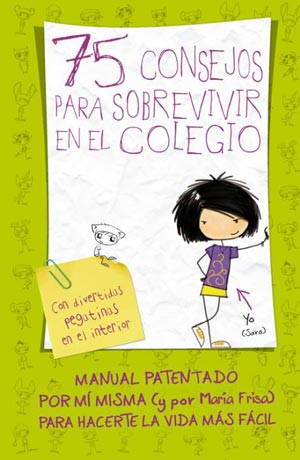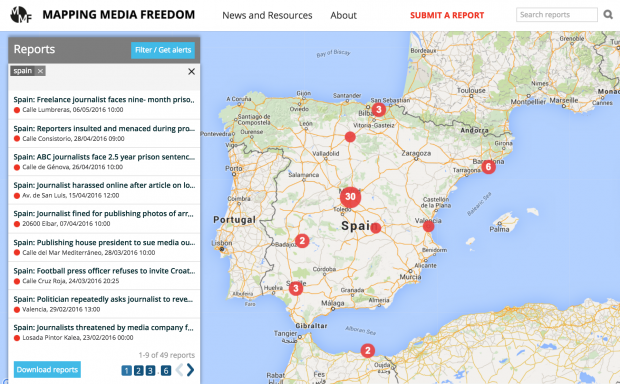4 Jul 2017 | Digital Freedom, Europe and Central Asia, Mapping Media Freedom, News and features, Spain
[vc_row][vc_column][vc_column_text]
Within the last month, Index on Censorship’s Mapping Media Freedom platform has recorded a number of restrictions on media access to events in Spain by police and politicians.
Melody Patry, Index’s head of advocacy, called to attention these encroachments on press freedoms by Spanish law enforcement: “The police are clearly — intentionally or not — restricting access to information and interfering with legitimate journalistic work,” she said. “This further highlights the need for improved policy and training of law enforcement bodies to protect freedom of expression and ensure journalists’ safety.”
On 10 June, police officers blocked access to journalists covering an eviction in Santiago de Compostela and threatened to fine them.
During a protest against an eviction, police obliged reporters to stand behind the police cordon a hundred meters from where the eviction was taking place. This restricted access made it difficult for the journalists to see and report on the event.
Police agents in plain clothes asked reporters for their IDs and personal documents while simultaneously refusing to identify themselves. According to the journalists, the police acted aggressively, wielding batons against them, threatening them with fines for taking photos and warning reporters that photos already taken would be erased.
Journalist Cristina Fallarás received a €600 fine on 13 June for disobeying police orders and standing on the street during a Madrid protest.
On 18 May, Fallarás participated in a protest against the assassination of Mexican journalists in front of the Mexican embassy in Madrid. Police cordoned off a road near the embassy. “There were so many people at the protest, we were squeezed, so I went on the road. A policeman told me to go back to the pavement,” the journalist told Público. Fallarás then explained to the policeman that she had not interrupted traffic on the road and that there were many people on the pavement. He asked for her ID.
“When I gave my ID I knew they were going to fine me but I didn’t think it would be a €600 fine,” Fallarás said. She was fined according to the Citizen Security Law, which some critical media outlets have called a ‘gag law’. She was notified of the fine on 13 June and has indicated a plan to appeal it.
On 16 June, the Spanish newspaper El País removed an article it had published on the parliament spokesman of the ruling party because the editor-in-chief considered it to be “inappropriate”.
The article criticised the behaviour of MP Rafael Hernando during a debate with MP Irene Montero. Within the opinion article, author Salazar called Hernando a “male chauvinist and misogynist”.
“They (El País) told me that the article is fantastic, that it will be published on the cover page of the web edition,” Salazar told Público. A few hours later, after 300 comments appeared on the article, El País told Salazar that the editor-in-chief, Antonio Caño, had read the article and said that it would have to be either “softer” or removed. “I told them that there was nothing to change,” said Salazar. He received another phone call, this time from the director of El País, who told him that to call Hernando a “male chauvinist and misogynist” was not appropriate. The article was then removed from the website.
The left-wing Podemos party failed to invite six Spanish media outlets to an “off the record” breakfast briefing on 20 June where they introduced the new party spokespeople to the rest of media.
Podemos excluded reporters from El País, la Cadena SER, El Periódico de Catalunya and online outlets El Independiente, Voz Pópuli and Ok Diario. The Madrid Press Association called it a “veto” on the media and asked Podemos to refrain from such actions in the future. According to the APM, all affected journalists typically report on Podemos.
Podemos’ members say that the party has a right to decide who will be invited to their private events and that there was a lack of confidence with the reporters in question.[/vc_column_text][/vc_column][/vc_row][vc_row][vc_column][vc_column_text]
Mapping Media Freedom
Click on the bubbles to view reports or double-click to zoom in on specific regions. The full site can be accessed at https://mappingmediafreedom.org/[/vc_column_text][/vc_column][/vc_row]
1 Aug 2016 | mobile, News and features, Spain
 In this guest post, the editor de Letras Libres España explains the uproar over of children’s book.
In this guest post, the editor de Letras Libres España explains the uproar over of children’s book.
More than 30,000 people have signed a petition to have 75 Tips to Survive School (75 Consejos para Sobrevivir en el Colegio) — a book by author María Frisa and published by Alfaguara in 2012 — pulled from the market in Spain.
The petition, hosted on Change.org, accuses the book of giving “toxic advice”, and of inciting sexism, disobedience and bullying. The publishing house said it will not withdraw the book, although the cover will emphasise that it is a work of fiction. The author issued a statement in which she regretted the misunderstanding surrounding her book.
The charge is old and familiar: Frisa is accused of corrupting the young. And the strategy is also old and familiar: intolerance and the literal mind posing as protecting the weak. We tend to think that those who restrict freedom of speech have evil motives. But they almost always act in defence of a noble cause, convinced of their good intentions.
The initial complaint came from @YaraCobaain, a Twitter user, on 23 July, and the petition was launched by Haplo Schaffer, a YouTuber. It was amplified by the media, which often merely repeated the petition’s ideas and points of view, thus distorting the contents of the book and presenting excerpts without explaining the context. It seems reasonable to assume that the vast majority of the signatories have not read the book. When Schaffer wrote the petition, he hadn’t either.
A careful reading of the petition on Change.org could have triggered some alarm: for example, the fact that it describes 75 Tips to Survive School as addressed to girls, as if in Spain books were segregated by gender (the book is not even directed towards a female reader: tip number 22, for example, is “finge ser simpático”, and the adjective “simpático” is in the masculine form). The campaign and some of the press presented the book as if it were a manual. Actually, and very clearly, Frisa’s book, which is part of a series, is a literary work of humorous fiction. The narrator, Sara, is a fictional character. She has irreverent opinions, describes tactics that are not presented as morally exemplary, and concocts plans which often go awry. The book’s tone is naive and childish. A reader might find the joke more or less funny, but it’s clearly a joke.
Regardless of the work’s genre, and though it might seem odd if someone does not like a book or its ideas they can choose not to buy it, and even not to read it. On top of ignoring the characteristics of the object that offends them, the petition’s signatories seem to overestimate the influence of literature on our behaviour and to underestimate the reading comprehension of the young – we can safely expect that it won’t always be as rough or twisted as the campaigners’. If we applied the same standard to every book written for children, or to every work that may fall into a child’s hands, we may have to do without a few, from Tom Sawyer to Matilda. We would probably have to withdraw The Simpsons and Robert Louis Stevenson as they would be considered a peril for the young, and I don’t know what we’d make of the Bible. Literature would lose complexity, richness, humor and the ability to help us understand different viewpoints and behaviours.
Although the campaign has denounced what it says is an incitement to bullying, it has harassed the writer and has intimidated the publishing house. In the book’s page on Amazon, the vast majority of comments were made after 23 July 2016, and they contain the ideas of the petition. Murcia, a region in Spain, has called for the withdrawal of the book. The author has claimed that she has received death threats. When Frisa published her statement, Schaffer, who has later distanced himself from the threats and insults of some campaigners on Twitter and on a commented reading of the novel on YouTube, wrote: “You are disgraceful and a coward, @MFrisa. I have been extremely polite so far, but enough is enough.” He tweeted to the publishing house: “If you want to present a coherent explanation, @Alfaguara_es, you still have time. If not, face the consequences, they won’t be nice.” Interestingly, in the explanations of some of his YouTube videos Schaffer defends the importance of freedom of speech.
In The Art of the Novel, Milan Kundera writes: “The word agélaste: it comes from the Greek and it means a man who does not laugh, who has no sense of humour. Rabelais detested agélastes. He feared them. He complained that the agélastes treated him so atrociously that he nearly stopped writing forever”
In 2016, 30,000 people in Spain have demanded the banning of a children’s book that in most cases they haven’t read. The petition states: “It is intolerable that such content is published, publicised and disseminated.”
Frisa has had the support of her publishing house, as well as some colleagues and members of the literary world. But one of the most striking things about this case is her helplessness before hysterical vigilantes and the stampede of people who have more energy to be indignant than time or desire to be properly informed. It’s partly explained by the dynamics of social networks, which are difficult to stop. But the role of many journalists has also been regrettable. Firstly, their job is to report events as they are, and in this case many have failed to do so. Secondly, those whose living depends on freedom of speech should be wary of this kind of phenomenon: armed with the best intentions, one day they might also come to shut you up.
A version of this article originally appeared in Letras Libres.
27 May 2016 | Europe and Central Asia, Mapping Media Freedom, mobile, News and features, Spain

When Axier López, the 37-year-old reporter for the Basque-language magazine Argia, opened the mailbox at his home in Barakaldo early April, he discovered he’d become the first journalist in Spain to be punished under the Public Security Law.
He was ordered to pay €601 (£466) for photos of an arrest he published on Twitter without state permission on 7 March.
“It is a fine similar to a parking ticket,” López told Mapping Media Freedom. “Signed by a local government representative, it claims I committed a crime by putting on-duty police officers in danger.”
The photos in question were taken when López was in the city of Eibar covering the arrest of a woman who had previously refused to appear in court. In 2007 she had participated in a protest against the forced closure of a local youth organisation which the state and court linked to a Basque separatist terrorist group. The woman was accused of blocking a road.
The so-called “gag law” under which López was fined came into force on 1 June 2015. It bans coverage of on-duty police officers without prior police permission and prohibits the publication of any clue as to their identity. The Spanish centre-right government said the purpose of the law is to protect officer security.
“What is the problem if we track and inform the public about events involving police officers?” López asked. “Policemen are paid with public money, so I don’t see a problem if they appear in media content.”
“Almost every day you can see arrests of different people on TV, where police officers appear in front of the camera, but they punished only us,” he added.
Journalists in Spain have recently come under mounting legal pressures related to their work.
In April two journalists from the daily newspaper ABC, Pablo Muñoz and Cruz Morcillo, were facing two-and-a-half-year prison sentences for publishing a telephone conversation between members of the Italian mafia, who were talking about Luis Bárcenas, former treasurer of Partido Popular. After an avalanche of support for the journalists, the general attorney in Madrid dropped the charges in May.
The journalists had published their article in July 2014, a year after police investigators intercepted the phone conversation between two mafioso. The general attorney had claimed they revealed details of a secret police investigation.
“Charges, in this case, were really severe,” said Elsa González, president of the Spanish Federation of Journalist Associations (FAPE), the main journalist body in the country. “A journalist has to publish information if it’s in the public interest.”
González added that according to a poll by Madrid’s Association of Journalist (APM), last year only 23.2% of reporters with permanent contracts and 22.2% of freelancers said they never received pressure to modify information in their reports. APM said the pressure could come from multiple angles, including political and corporate powers, public institutions and advertisers.
A group of Spanish media companies has also recently been threatened with legal action after online newspapers El Confidencial and Eldiario.es, along with private TV channel La Sexta reported that Juan Luís Cebrián, president of the Prisa media group, publisher of the national newspaper El País and sports daily AS, appeared in the Panama Papers.
On 26 April Prisa issued a statement on its website stating that its president had taken legal action against the outlets for “clear defamatory intent” by linking Cebrián to the Panama Papers “in which he categorically does not appear”.
The centre-right daily newspaper El Mundo, a competitor of Prisa’s left-leaning daily El País, then reported that journalists who work for Prisa publishing house were prohibited from engaging with the three media outlets.
Nacho Cardero, director of El Confidencial, told Mapping Media Freedom that Cebrián has yet to take any formal action.
“At the moment there are no actions against any of the three media sources and furthermore, the intention to expel contributors of El Confidencial, La Sexta or Eldiario.es from his group, hasn’t occurred,” said Cardero. “However, Prisa has closed the door to Ignacio Escolar, director of Eldiario.es.”
López believes all these cases serve to spread fear among journalists. Meanwhile, his appeal against his fine has been refused. It could have been reduced to €300 (£232) if he had paid in 15 days. “However, we are not going to pay because we were doing our job,” he said.
“I don’t know where we can go in the legal process,” López added. “But it is important that the debate on this law is open and that we resist in order to prevent possible fear in other journalists.”
Mapping Media Freedom approached Cebrián for comment but received no response.
25 Jun 2013 | Digital Freedom, Europe and Central Asia
Should search engines be forced to block results that link to newspaper articles? No, the Advocate General of the European Court of Justice said earlier today, deciding Google need not block “legal and legitimate information that has entered the public domain”. Brian Pellot writes
(more…)


 In this guest post, the editor
In this guest post, the editor 